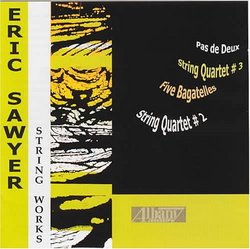Engaging Music by a Young American Composer
J Scott Morrison | Middlebury VT, USA | 11/14/2005
(4 out of 5 stars)
"Eric Sawyer, currently on the music faculty at Amherst College in western Massachusetts, is a Harvard-, California- and Columbia-educated composer. This disc contains four works that fall naturally into two groups: two works composed in 1999 and two in 2002. The CD starts out with the latter two - 'String Quartet No. 3' and 'Five Bagatelles' for cello and piano. Both works are polytonal, abundantly melodic, rhythmically inventive and extremely attractive. The quartet is played by the Lighthouse Chamber Players which includes musicians of high accomplishment although I'd only ever heard of one of them - Nardo Poy, the long-time principal violist of the Orpheus Chamber Orchestra. In four movements whose designations are rather mundanely listed a I, II, III and IV, the style is rather neoclassic but with admixtures of bluesy harmonies, expressive portamenti, scurrying and almost breathless figures as well as languid and lyrical melodies. The composer, in his booklet notes, refers to the work as 'outgoing and effusive' and that is certainly true. A most attractive work. Its companion, written at about the same time, is the charming 'Five Bagatelles' for cello and piano. For me, these five pieces are the most attractive works on the set and they are played beautifully by cellist Hekun Wu and pianist Elise Yun. I found myself repeatedly playing No. III, a slow, dreamy song whose rising portamenti seem to describe a kind of yawning and stretching, a kind of slow awakening. Simply lovely.
'String Quartet No. 2' from 1999 is in an altogether more astringent manner and indeed reminds me a bit of music by one of Sawyer's teachers, Andrew Imbrie. In three movements, designated (ho hum) I, II and III, the quartet is rather spare and almost reticent. It has moments of high drama, but mostly it seems a much more inward than its successor. There is more classic development of material than in No. 2. There are Hindemithean patches of counterpoint and dollops of polytonality throughout. It is played by the Arden String Quartet and one must admit that there seem to be some passages with uncertain tuning that crop up. Otherwise, it is a fine performance. The Quartet is coupled with the one-movement 'Pas de deux' for violin and cello, played here by Francine Trester, violin, and Michael Bonner, cello. Also in the more dissonant style of the Second Quartet, it calls for close-order drill by the two instrumentalists. Some exceedingly complex writing is handled admirably by the players. Sawyer, in his rather cursory notes, refers to the piece as being in a 'lighter vein' than the companion quartet, but I frankly don't hear it. This seems like a serious piece with serious intent.
Sawyer is clearly a skilled and talented composer. I've been unable to find out much about him, but did learn that he is writing (or has written) an opera called 'Our American Cousin' which one presumes must be about Abraham Lincoln's assassination, a marvelous idea for operatic treatment, I should think. ('Our American Cousin' was the play Lincoln was attending when he was shot by John Wilkes Booth.) I would like to know more about that and also wonder if he has written things for full orchestra. A composer to watch.
Scott Morrison"


 Track Listings (4) - Disc #1
Track Listings (4) - Disc #1